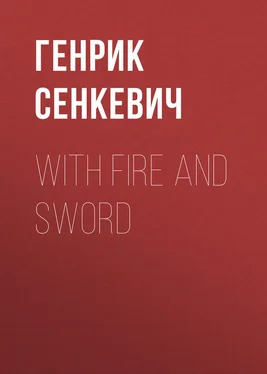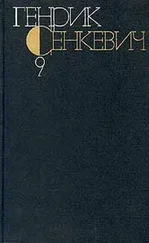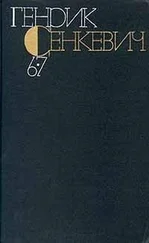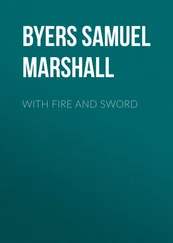Генрик Сенкевич - With Fire and Sword
Здесь есть возможность читать онлайн «Генрик Сенкевич - With Fire and Sword» — ознакомительный отрывок электронной книги совершенно бесплатно, а после прочтения отрывка купить полную версию. В некоторых случаях можно слушать аудио, скачать через торрент в формате fb2 и присутствует краткое содержание. Жанр: foreign_antique, foreign_prose, на английском языке. Описание произведения, (предисловие) а так же отзывы посетителей доступны на портале библиотеки ЛибКат.
- Название:With Fire and Sword
- Автор:
- Жанр:
- Год:неизвестен
- ISBN:нет данных
- Рейтинг книги:4 / 5. Голосов: 1
-
Избранное:Добавить в избранное
- Отзывы:
-
Ваша оценка:
- 80
- 1
- 2
- 3
- 4
- 5
With Fire and Sword: краткое содержание, описание и аннотация
Предлагаем к чтению аннотацию, описание, краткое содержание или предисловие (зависит от того, что написал сам автор книги «With Fire and Sword»). Если вы не нашли необходимую информацию о книге — напишите в комментариях, мы постараемся отыскать её.
With Fire and Sword — читать онлайн ознакомительный отрывок
Ниже представлен текст книги, разбитый по страницам. Система сохранения места последней прочитанной страницы, позволяет с удобством читать онлайн бесплатно книгу «With Fire and Sword», без необходимости каждый раз заново искать на чём Вы остановились. Поставьте закладку, и сможете в любой момент перейти на страницу, на которой закончили чтение.
Интервал:
Закладка:
And while he was speaking in this manner, it seemed that not a captive, not a soldier after a lost battle was speaking, but a proud hetman, certain of victory on the morrow. This greatness of soul and faith in the Commonwealth flowed like balsam over the wounds of the lieutenant. He had had a near view of the power of Hmelnitski, therefore it blinded him somewhat, especially since success had followed it to that moment. But Charnetski must be right. The forces of the hetmans were still intact, and behind them stood the power of the Commonwealth, the rights of authority, and the will of God. The lieutenant therefore went away strengthened in soul and more cheerful. When going he asked Charnetski if he did not wish to begin negotiations for his freedom with Hmelnitski at once.
"I am the captive of Tugai Bey," said Charnetski; "to him I will pay my ransom. But with that fellow Hmelnitski I will have nothing to do; I give him to the hangman."
Zakhar, who had made it easy for Skshetuski to see the prisoners, comforted him while returning to the telega.
"Not with young Pototski, but with the hetmans is the difficulty. The struggle is only begun, but what will be the end, God knows! The Cossacks and Tartars have taken Polish treasure, it is true, but it is one thing to take and another to keep. And you, my child, do not grieve, do not despair, for you will get your freedom in time. You will go to your own people, and I, old man, shall be sorry for you. It is sad for an old man alone in the world. With the hetmans it will be hard, oh, how hard!"
In truth the victory, though brilliant, did not in the least decide the struggle for Hmelnitski. It might even be unfavorable for him, because it was easy to foresee that now the Grand Hetman, to avenge his son, would press upon the Cossacks with special stubbornness, and would leave nothing undone to break them at once. The Grand Hetman, however, cherished a certain dislike for Prince Yeremi, which, though veiled with politeness, was still evident enough in various circumstances.
Hmelnetski, knowing this perfectly, admitted that now this dislike would cease, and Pototski would first reach out his hand in reconciliation, which would secure for him the assistance of a famous warrior and his powerful troops. With such forces united under a leader like the prince, Hmelnitski did not dare yet to measure strength, for he had not yet sufficient confidence in himself. He determined therefore to hasten, and together with the news of the defeat of Jóltiya Vodi, appear in the Ukraine, and strike the hetmans before the succor of the prince could arrive.
He gave no rest to his troops, therefore, but at daybreak after the battle hurried on. The march was as rapid as if the hetman were fleeing. It was as if an inundation were covering the steppe and rushing forward, collecting all the waters on the way. Forests, oak-groves, grave-mounds were avoided; rivers were crossed without halting. The Cossack forces increased on the road, for new crowds of peasants fleeing from the Ukraine were added to them continually.
They brought news of the hetmans, but contradictory. Some said that Prince Yeremi was yet beyond the Dnieper; others that he had joined the forces of the crown. But all declared that the Ukraine was already on fire. The peasants were not only fleeing to meet Hmelnitski in the Wilderness, but burning villages and towns, throwing themselves on their masters, and arming everywhere. The forces of the crown had been fightings for the past two weeks. Stebloff was destroyed; at Derenhovtsi a bloody battle had been fought. The town Cossacks in various places went over to the side of the people, and at all points were merely waiting for the word. Hmelnitski had reckoned on all this, and hastened the more.
At last he stood on the threshold. Chigirin opened wide her gates. The Cossack garrison went over at once to his regiments. The house of Chaplinski was wrecked; a handful of nobles, seeking refuge in the town, were cut to pieces. Joyful shouts, ringing of bells, and processions ceased not for a moment. The whole region flamed up at once. All living men, seizing scythes and pikes, joined the Zaporojians; endless crowds hastened to the camp from every side. There came also joyful, because certain, tidings that Yeremi had indeed offered his assistance to the hetmans, but had not yet joined them.
Hmelnitski felt relieved. He moved on without delay, and advanced through insurrection, slaughter, and fire. Ruin and corpses bore witness to this. He advanced like an avalanche, destroying everything in his path. The country rose before him, and was a desert behind. He went like an avenger, like a legendary dragon; his footsteps pressed out blood, his breath kindled conflagrations.
In Cherkasi he halted with his main forces, sending in advance the Tartars under Tugai Bey and the wild Krívonos, who came up with the Polish hetmans at Korsún and attacked them without delay. The Tartars were forced to pay dearly for their boldness. Repulsed, decimated, scattered, they retreated in confusion.
Hmelnitski hurried to their aid. On the way news reached him that Senyavski with some regiments had joined the hetmans, who had left Korsún, and were marching on Boguslav. This was true. Hmelnitski occupied Korsún without resistance, and leaving there his trains and provisions, in a word, his whole camp, hurried after them. He had no need to follow long, for they had not gone far. At Krutaya Balka his advance guard came upon the Polish camp.
It was not given to Skshetuski to see the battle, for he remained in Korsún with the camp. Zakhar lodged him on the square, in the house of Zabokshytski, whom the crowd had already hanged, and placed a guard from the remnants of the Mirgorod kuren; for the crowd robbed continually, and killed every man who seemed to them a Pole. Through the broken windows Skshetuski saw the multitude of drunken peasants, bloody, with rolled-up shirt-sleeves, going from house to house, from cellar to cellar, and searching all corners, garrets, lofts; from time to time a terrible noise announced that a nobleman, a Jew, a man, a woman, or a child had been found. The victim was dragged to the square and gloated over in the most fearful manner. The crowd fought with one another for the remnants of the bodies; with delight they rubbed the blood on their faces and breasts, and wound the still steaming entrails around their necks. They seized little Jews by the legs and tore them apart amid the wild laughter of the mob. They rushed upon houses surrounded by guards in which distinguished captives were confined, – left living because large ransoms were expected from them. Then the Zaporojians or the Tartars standing guard repulsed the crowd, thumping the assailants on the heads with their pikestaffs, bows, or ox-hide whips. Such was the case before the house where Skshetuski was. Zakhar gave orders to handle the crowd without mercy, and the Mirgorod men executed the order with pleasure; for the men of the lower country received the assistance of the mob willingly in time of insurrection, but had more contempt for them than they had for the nobility. It was not in vain therefore that they called themselves "nobly born Cossacks." Later Hmelnitski himself presented more than once considerable numbers of the mob to the Tartar, who drove them to the Crimea, where they were sold into Turkey and Asia Minor.
The crowd rioted on the square, and reached such wild disorder that at last they began to kill one another. The day was drawing to an end. One side of the square and the priest's house were on fire. Fortunately the wind blew the fire toward the field, and prevented the extension of the conflagration. But the gigantic flame lighted up the square as brightly as the sun's rays. The excitement became too great for restraint. From a distance came the terrible roar of cannon; it was evident that the battle at Krutaya Balka was growing fiercer and fiercer.
Читать дальшеИнтервал:
Закладка:
Похожие книги на «With Fire and Sword»
Представляем Вашему вниманию похожие книги на «With Fire and Sword» списком для выбора. Мы отобрали схожую по названию и смыслу литературу в надежде предоставить читателям больше вариантов отыскать новые, интересные, ещё непрочитанные произведения.
Обсуждение, отзывы о книге «With Fire and Sword» и просто собственные мнения читателей. Оставьте ваши комментарии, напишите, что Вы думаете о произведении, его смысле или главных героях. Укажите что конкретно понравилось, а что нет, и почему Вы так считаете.












